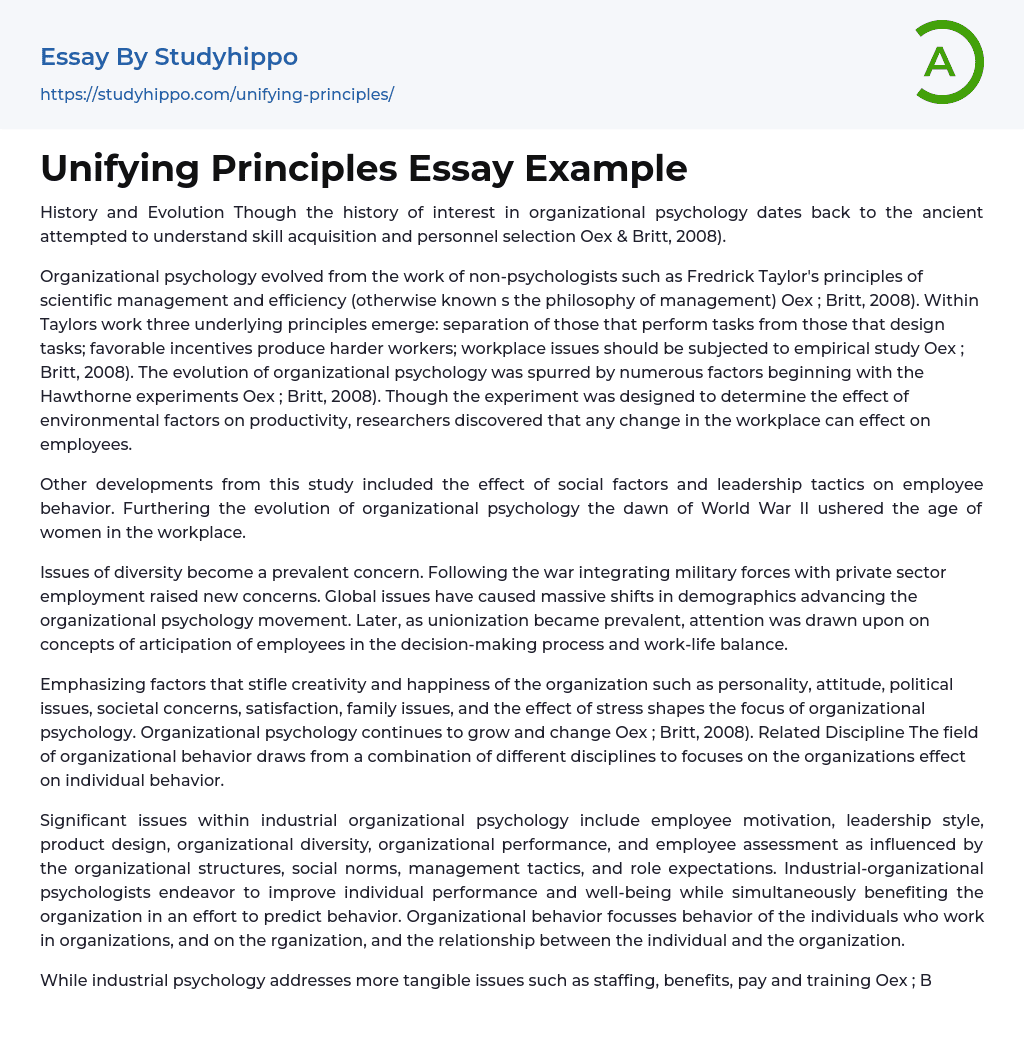The interest in organizational psychology has a long history, dating back to ancient times when attempts were made to understand skill acquisition and personnel selection (Oex & Britt, 2008). The evolution of organizational psychology began with the work of non-psychologists like Fredrick Taylor, who developed principles of scientific management and efficiency. Taylor's work highlighted three underlying principles, including the separation of task performers from designers, favorable incentives for harder workers, and the need for empirical studies of workplace issues (Oex & Britt, 2008). The Hawthorne experiments marked the beginning of numerous factors that spurred the evolution of organizational psychology. These experiments were designed to identify the effect of environmental factors on productivity but revealed that any change in the workplace could affect employees. This study also led to other developments, such as the discovery of the impact of social fact
...ors and leadership tactics on employee behavior. The dawn of World War II ushered in an age of women in the workplace, leading to increased concerns surrounding diversity issues. Integration of military forces with private sector employment after the war raised new concerns and global issues have caused massive shifts in demographics, advancing the organizational psychology movement.
The prevalence of unionization drew attention to the participation of employees in decision-making and work-life balance in the field of organizational psychology. The focus of this field includes factors such as personality, attitude, political issues, societal concerns, satisfaction, family issues, and stress that can stifle creativity and happiness within an organization. Organizational psychology continues to develop (Oex; Britt, 2008), and draws from different disciplines to address significant issues like employee motivation, leadership style, product design, organizational diversity, performance
assessment, and how organizational structures, social norms, management tactics, and role expectations influence employee behavior. The goal of industrial-organizational psychologists is to enhance individual performance and well-being while benefiting the organization by predicting behavior. Organizational behavior is concerned with the behavior of individuals working within the organization and their relationship with it. While industrial psychology deals with practical issues such as staffing, training, pay, and benefits (Oex; Britt, 2008).The management of human resources is the primary concern of industrial organizational psychology, which is an applied field that relies on theoretical research (Oex and Britt, 2008). It has its roots in experimental psychology and encompasses personnel psychology, human computer interaction, and human factors. There are two components of industrial organizational psychology; industrial psychology aligns individuals to specific job roles based on their characteristics, and then matches them with jobs where they are likely to perform well. The other component is concerned with the development of job performance standards, training employees, and increasing workplace productivity (Oex and Britt, 2008). Industrial-organizational psychologists are responsible for designing training programs, assisting with employee selection, developing appropriate ergonomics, managing performance, employee satisfaction and organizational development. They assess applicant qualifications through screening tests to determine their suitability for a particular role. Industrial-organizational psychologists identify the skills required for specific tasks and develop training programs to enhance employee performance (Oex and Britt, 2008).Industrial-organizational psychologists specialize in improving performance and productivity through techniques and procedures that take into account ergonomics. They strive to minimize injury while maximizing output and often work with employees to overcome organizational obstacles that may impede progress. By redesigning products and structures, these psychologists help organizations increase profits while improving
employee satisfaction. Organizational psychology is a scientific field where knowledge is applied to organizations, merging scientific approaches with practical applications through the scientist-practitioner model. Practical concerns motivate research, and incorporating relevant theory into organizational needs creates a working model that enhances group effectiveness. While practice often leads research, the scientist-practitioner approach ensures a relevant and effective solution for enhancing productivity.The collaborative relationship between scientific research, theory, and organizational dynamics drives the utilization of inductive and deductive reasoning in organizational psychology. By adopting a scientific practitioner approach, psychologists can produce relevant and scientifically grounded results. In data collection and analysis, psychologists often rely on surveys, archived data, experimentation, and quasi-experimentations. Among these methods, survey research is the most commonly used due to its affordability and ability to reach large numbers of participants quickly. However, concerns surrounding survey design, participant comprehension, and honesty must be considered. While archival data is readily available for use, experiments allow for clarifying cause and focusing on specific variables. Quasi-experiments provide a realistic setting for data collection. Once data has been collected, appropriate analysis methods must be selected.
- Animals essays
- Charles Darwin essays
- Agriculture essays
- Archaeology essays
- Moon essays
- Space Exploration essays
- Sun essays
- Universe essays
- Birds essays
- Horse essays
- Bear essays
- Butterfly essays
- Cat essays
- Dolphin essays
- Monkey essays
- Tiger essays
- Whale essays
- Lion essays
- Elephant essays
- Mythology essays
- Time Travel essays
- Discovery essays
- Thomas Edison essays
- Linguistics essays
- Journal essays
- Chemistry essays
- Biology essays
- Physics essays
- Seismology essays
- Reaction Rate essays
- Roman Numerals essays
- Scientific Method essays
- Mineralogy essays
- Plate Tectonics essays
- Logic essays
- Genetics essays
- Albert einstein essays
- Stars essays
- Venus essays
- Mars essays
- Evolution essays
- Human Evolution essays
- Noam Chomsky essays
- Methodology essays
- Eli Whitney essays
- Fish essays
- Dinosaur essays
- Isaac Newton essays
- Progress essays
- Scientist essays




